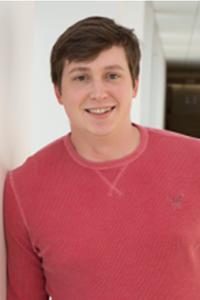Splash Biography
GANNON CONNOR, 4th year Yale graduate student in chemistry
|
Major: Chemistry College/Employer: Yale Year of Graduation: G |

|
Brief Biographical Sketch:
Gannon is currently a graduate student at Yale University studying new methods of converting dinitrogen in the air into fertilizer components using transition metal complexes and electricity. He received his Master of Science degree in chemistry from Yale in 2017 and his Bachelor of Science degree in chemistry from the College of William and Mary (Williamsburg, VA) in 2014, where he also minored in Biology. He grew up on the beaches of Monterey, CA, and Virginia Beach, VA, so he has no excuse to still not know how to surf at this point. However, he does love long walks on the beach, as well as watching horror movies, listening to loud electronic music, playing soccer, and randomly finding four-leafed clovers. Past Classes(Clicking a class title will bring you to the course's section of the corresponding course catalog)E2821: Catalysis in Action: Demonstrations and Discussions on Speeding-up Chemical Reactions in Sprout Fall 17 (Sep. 30 - Oct. 14, 2017)
Without help, many important chemical reactions in industry and in biology are WAY WAY WAY too slow to be useful. Catalysts allow for these reactions to proceed faster, but how do they do it? This class will explore the particular mechanisms of speeding up reactions using a few real-life examples of chemical or biological catalysts. The entire class will be supplemented by demonstrations that will allow students to learn the interesting characteristics of chemical catalysis. These lessons will be further supported through open discussion and small-group collaboration sessions. The class material is applicable to the fields of chemistry, biology, and medicine.
S2891: Catalysis in Action: Demonstrations and Discussions on Speeding-up Chemical Reactions in Splash Fall 17 (Nov. 11, 2017)
Without help, many important chemical reactions in industry and in biology are WAY WAY WAY too slow to be useful. Catalysts allow for these reactions to proceed faster, but how do they do it? This class will explore the particular mechanisms of speeding up reactions using a few real-life examples of chemical or biological catalysts. The entire class will be supplemented by demonstrations that will allow students to learn the interesting characteristics of chemical catalysis. These lessons will be further supported through open discussion and small-group collaboration sessions. The class material is applicable to the fields of chemistry, biology, and medicine.
|
|
